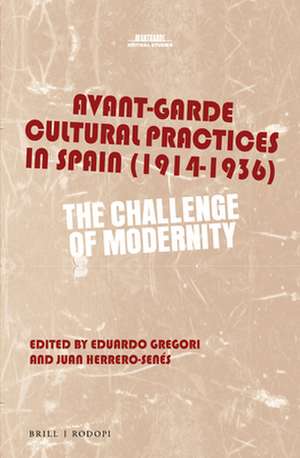Avant-Garde Cultural Practices in Spain (1914-1936): The Challenge of Modernity: Avant-Garde Critical Studies, cartea 31
Eduardo Gregori, Juan Herrero-Senésen Limba Engleză Hardback – 20 apr 2016
Contributors: Rosa Berland, Jennifer Duprey, Marcos Eymar, Regina Galasso, Eduardo Gregori, Juan Herrero-Senés, John McCulloch, Andrés Pérez-Simón, Lynn Purkey, Domingo Ródenas de Moya, Evelyn Scaramella and Antonio Sáez Delgado.
Din seria Avant-Garde Critical Studies
-
 Preț: 145.57 lei
Preț: 145.57 lei -
 Preț: 233.13 lei
Preț: 233.13 lei -
 Preț: 317.17 lei
Preț: 317.17 lei -
 Preț: 291.17 lei
Preț: 291.17 lei -
 Preț: 307.02 lei
Preț: 307.02 lei - 15%
 Preț: 415.58 lei
Preț: 415.58 lei -
 Preț: 230.77 lei
Preț: 230.77 lei - 18%
 Preț: 530.73 lei
Preț: 530.73 lei - 18%
 Preț: 529.89 lei
Preț: 529.89 lei - 15%
 Preț: 440.65 lei
Preț: 440.65 lei -
 Preț: 233.43 lei
Preț: 233.43 lei - 18%
 Preț: 671.13 lei
Preț: 671.13 lei - 15%
 Preț: 424.59 lei
Preț: 424.59 lei -
 Preț: 202.83 lei
Preț: 202.83 lei - 18%
 Preț: 601.18 lei
Preț: 601.18 lei - 18%
 Preț: 582.53 lei
Preț: 582.53 lei - 18%
 Preț: 612.23 lei
Preț: 612.23 lei -
 Preț: 329.61 lei
Preț: 329.61 lei - 18%
 Preț: 634.78 lei
Preț: 634.78 lei - 18%
 Preț: 715.65 lei
Preț: 715.65 lei - 15%
 Preț: 500.59 lei
Preț: 500.59 lei - 15%
 Preț: 446.51 lei
Preț: 446.51 lei - 18%
 Preț: 803.24 lei
Preț: 803.24 lei -
 Preț: 387.28 lei
Preț: 387.28 lei -
 Preț: 146.70 lei
Preț: 146.70 lei - 15%
 Preț: 391.39 lei
Preț: 391.39 lei - 15%
 Preț: 433.25 lei
Preț: 433.25 lei
Preț: 525.00 lei
Preț vechi: 617.64 lei
-15% Nou
Puncte Express: 788
Preț estimativ în valută:
100.47€ • 104.51$ • 82.94£
100.47€ • 104.51$ • 82.94£
Carte indisponibilă temporar
Doresc să fiu notificat când acest titlu va fi disponibil:
Se trimite...
Preluare comenzi: 021 569.72.76
Specificații
ISBN-13: 9789004310179
ISBN-10: 9004310177
Pagini: 228
Dimensiuni: 155 x 235 mm
Greutate: 0.45 kg
Editura: Brill
Colecția Brill
Seria Avant-Garde Critical Studies
ISBN-10: 9004310177
Pagini: 228
Dimensiuni: 155 x 235 mm
Greutate: 0.45 kg
Editura: Brill
Colecția Brill
Seria Avant-Garde Critical Studies
Cuprins
Foreword
M. Marope
Introduction
Chapter 1: Mindfulness
At One with the Cosmos
Jacobo
The Mindfulness Craze
Views of the Sceptic and the Cynic
Other Avenues for Peace of Mind
Walking and Running
Mind Wandering
The Arts
Schools and the Arts
Three Points
What Did We Do with Jacobo?
Conclusion
Chapter 2: Singularity
Meaning of “Singularity”
Can Human Intelligence by Simulated?
Can Computers Take on a Life of Their Own?
Points Made Thus Far
Educational Responses
Ethical, Consequential STEM
Integrated Technology
Post-Singularity Higher-Order Thinking
Conclusion
Chapter 3: Terrorism
9/11 Onwards
What Is It That Drives People to Become Terrorists and How Can Education Prevent or Reduce It?
How Should the Education We Design for Young People Present the Phenomenon of Terrorism Historically, Politically and Philosophically?
How Do Schools Prepare Young People Psychologically and Spiritually for a World in Which Terrorism Exists?
Conclusion
Chapter 4: Sustainability
Introduction
The Catastrophe of the Environment: What Research Tells Us
Human Responses
Conclusion
Chapter 5: Post-Truth Politics
Zach
What Is Truth?
Postmodernism and Truth: Relativistic Discourses
Historical Revisionism
Propaganda
Contemporary Political Approaches to Truth
Zach Again
Conclusion
Chapter 6: Knowledge
Skills Versus Knowledge
Bloom’s Taxonomy Revised … Again!
The Role of the Teacher
Rote Learning
A Twenty-First Century Education
Sarah
Conclusion
Chapter 7: Character
Discipline
Ethics
Values in Schools
Emotional Intelligence
Bringing the Pieces Together in Character Education
Conclusion
Chapter 8: Conclusion: The Framework
The Purpose of the Framework
Note 1: On Character
Note 2: On STEM Criteria
About the Author
M. Marope
Introduction
Chapter 1: Mindfulness
At One with the Cosmos
Jacobo
The Mindfulness Craze
Views of the Sceptic and the Cynic
Other Avenues for Peace of Mind
Walking and Running
Mind Wandering
The Arts
Schools and the Arts
Three Points
What Did We Do with Jacobo?
Conclusion
Chapter 2: Singularity
Meaning of “Singularity”
Can Human Intelligence by Simulated?
Can Computers Take on a Life of Their Own?
Points Made Thus Far
Educational Responses
Ethical, Consequential STEM
Integrated Technology
Post-Singularity Higher-Order Thinking
Conclusion
Chapter 3: Terrorism
9/11 Onwards
What Is It That Drives People to Become Terrorists and How Can Education Prevent or Reduce It?
How Should the Education We Design for Young People Present the Phenomenon of Terrorism Historically, Politically and Philosophically?
How Do Schools Prepare Young People Psychologically and Spiritually for a World in Which Terrorism Exists?
Conclusion
Chapter 4: Sustainability
Introduction
The Catastrophe of the Environment: What Research Tells Us
Human Responses
Conclusion
Chapter 5: Post-Truth Politics
Zach
What Is Truth?
Postmodernism and Truth: Relativistic Discourses
Historical Revisionism
Propaganda
Contemporary Political Approaches to Truth
Zach Again
Conclusion
Chapter 6: Knowledge
Skills Versus Knowledge
Bloom’s Taxonomy Revised … Again!
The Role of the Teacher
Rote Learning
A Twenty-First Century Education
Sarah
Conclusion
Chapter 7: Character
Discipline
Ethics
Values in Schools
Emotional Intelligence
Bringing the Pieces Together in Character Education
Conclusion
Chapter 8: Conclusion: The Framework
The Purpose of the Framework
Note 1: On Character
Note 2: On STEM Criteria
About the Author
Notă biografică
Eduardo Gregori (PhD, 2009. Penn State University) is Associate Professor of Spanish at the University of Wisconsin-Marathon County. He has published on Modernism and the Spanish avant-garde.
Juan Herrero Senés. Ph.D (2006). Universitat Pompeu Fabra (Barcelona), is Assistant Professor of Spanish at the University of Colorado Boulder. He has published monographs and articles on the Spanish avant-garde, the interwar novel and translational modernism.
Juan Herrero Senés. Ph.D (2006). Universitat Pompeu Fabra (Barcelona), is Assistant Professor of Spanish at the University of Colorado Boulder. He has published monographs and articles on the Spanish avant-garde, the interwar novel and translational modernism.
